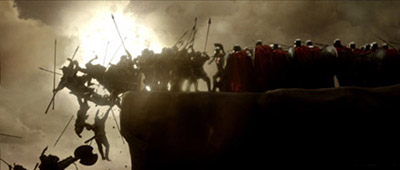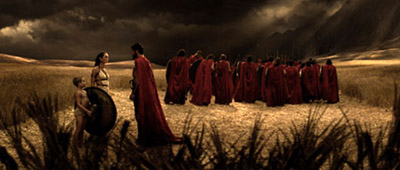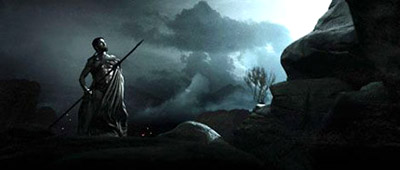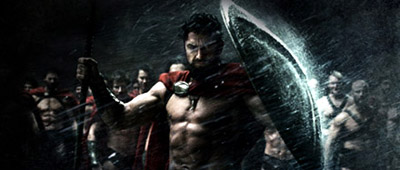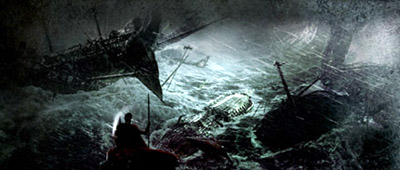
|
 |
|||||||
|
(2007) " ... fills a much-needed gap between gay porn and recruitment film"
by Johnny Web (Uncle Scoopy; Greg Wroblewski)
|
||||||||
|
||||||||
|
THE CRITICS AND ACADEMIES
|
||||||||
|
||||||||
|
THE BOX OFFICE Box Office Mojo. It was budgeted at $60 million for production, and had an opening weekend of $70 million. It will gross more than $200 million in the USA. |
||||||||
|
NUDITY REPORT
|
||||||||
The battle of Thermopylae is certainly a fascinating subject. You have learned in your schoolbooks that Herodotus was the father of history, but that is misleading. He wrote about Thermopylae four decades after the events happened. (Herodotus was about four years old when the battle took place.) If he was the first objective historian, then who did he get his accounts from? Well, either there were plenty of objective accounts before him, or he had to rely on non-objective people. He wrote the "history" by listening to old men tell war stories. You know how that goes. Worse yet, they were not even the right men, since the heroes all died. As for his role as the man who created objective history, well, even if Herodotus tried and succeeded partially, he didn't have much impact. Even two millennia after his day there was very little in the way of objective history being written! The "father of history" himself is properly classified somewhere between a historian, a cheerleader, and an epic poet. Herodotus incorporated fewer obvious myths into his yarns than can be found in the Iliad, so that made him a historian in comparison to the Homeric tradition, but not a very good one. He estimated the size of the Persian attack force at 5.2 million people, including non-combatants. Modern military historians have a good laugh over that number. (In addition to the logistical problems with feeding a force that size with the resources available in the ancient world, mathematicians have estimated the entire population of the world to be about 100 million people at the time which would include about 25 million adult males - all of whom seem to have gathered to battle the 300 Spartans that day!) Hans Delbrueck wrote in "Stories of the Art of War" (p. 106) that the correct number for the Persian attack force that day may have been as low as 15,000-20,000. That is the low end among historians, but you get an idea of the range involved, from fifteen thousand to several million. Even the most ardent supporters of Herodotus can offer no more passionate defense than to say "Herodotus, by his day's standards, was fairly accurate in his accounts." (Quote from Wikipedia.) That faint praise is roughly tantamount to a future pop historian saying that Carrot Top was fairly funny by the standard of other prop comedians of his day. According to Herodotus, the only reason the 300 Spartans (and their 7,000 allies) lost to the Persians at all is because they were betrayed by a traitor! "Geez, if not for that guy, we'd have kicked all five million of their asses!" Some modern historians have come up with a logical explanation for the numbers offered by Herodotus. Suppose that a future historian read that there were a billion people in China in our time. If he makes only a tiny slip, he might conclude that the country was home to 1,000,000,000,000 people. Why? Because that is what a billion means in most languages, and used to mean in Great Britain. What Americans call a billion is called a milliard by the rest of the world. Herodotus ran into a similar confusion. The current scholarly consensus is that Herodotus, who spoke no Persian, probably confused the Persian terms for chiliarchy (1,000) and myriarchy (10,000).(1) Dividing the Herodotus estimates by ten should give a reasonable number. Oh, well, the exaggerations don't really matter, do they? However large the Persian force really was in September of 480 BC, it was far larger than the number of defenders, and the defense by the Greeks was still a memorable demonstration of bravery which inspired the tales of glory which have come done to us.
|
||||||||
|
|
||||||||
|
|
||||||||
|
|
||||||||
|
|
||||||||
|
Our Grade: If you are not familiar with our grading system, you need to read the explanation, because the grading is not linear. For example, by our definition, a C is solid and a C+ is a VERY good movie. There are very few Bs and As. Based on our descriptive system, this film is a: C+ It is certainly an impressive genre film, but it leaves me with the nagging feeling that it could have been so much more with just a little less spectacle and a little more humanity. The film didn't really meet with my taste. It is obviously aimed at a target audience no older than about 24, and its R-rating guarantees that it will set the all-time record for sneak-ins by teen boys. I was impressed by the stylized imagery, of course. Who could not be? In fact, I liked the film a great deal and bought into it completely until the battle actually began, after which it seemed like really nothing more than swords and spears plunging into things. After about thirty minutes of that, the novelty of the visuals had worn off and I was drifting off, ready for the wrap-up. Unfortunately, the film's version of the battle is probably longer than the Spartans actually lasted on the battlefield. On the other hand, there is so much slo-mo that the actual battle footage is probably only ten minutes long in real time. There are times when the images move so slowly that you wonder why they didn't just hire Ken Burns to photograph the comic book. As I mentioned, watching the battle itself is exactly like watching a real expert play a video game on an extremely large screen. Personally, I love video games when I am controlling the action, but have never found video gaming to be a good spectator sport.
|
||||||||
